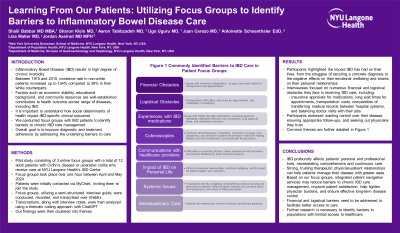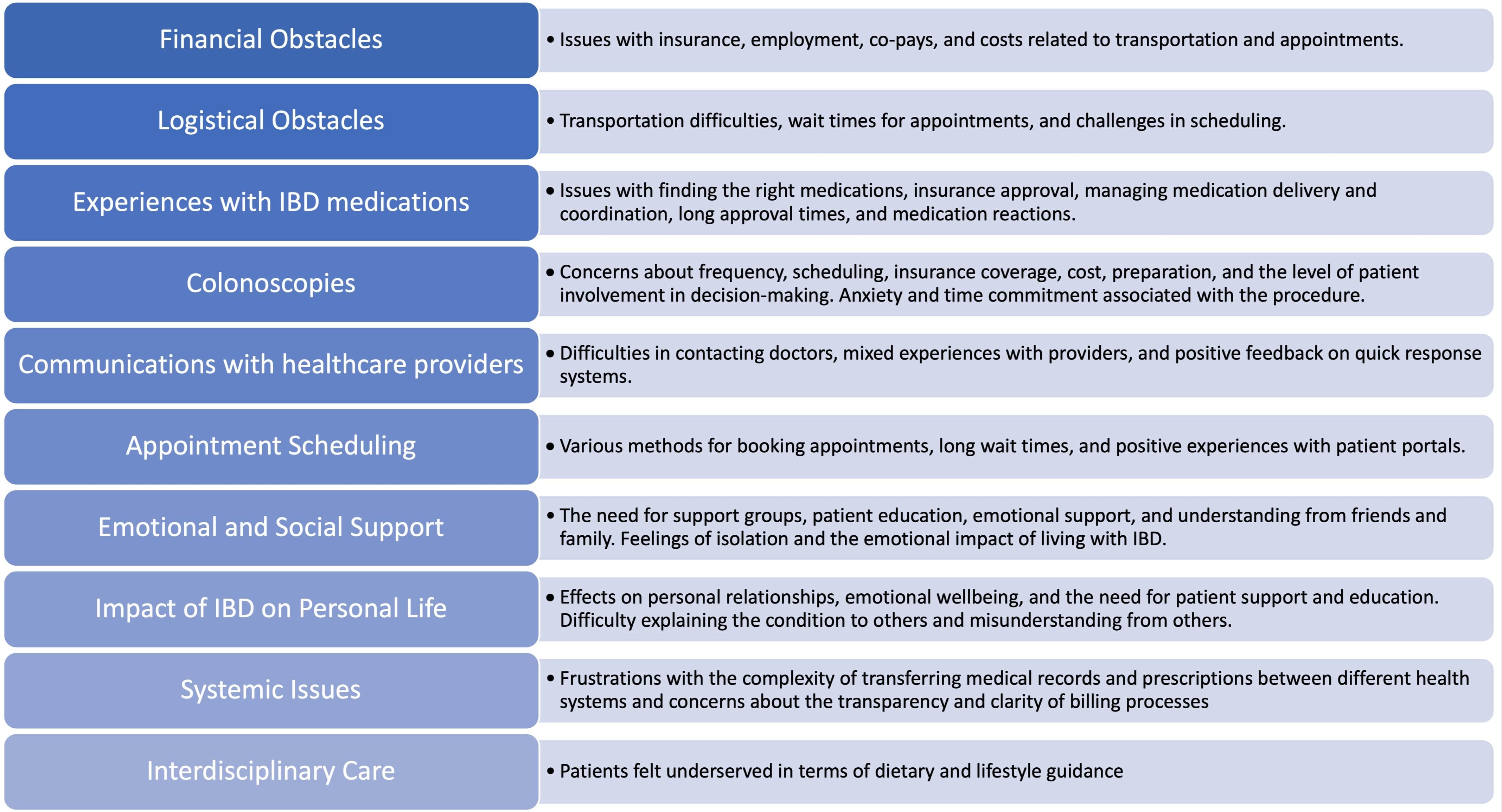Sunday Poster Session
Category: IBD
P0949 - Learning From Our Patients: Utilizing Focus Groups to Identify Barriers to Inflammatory Bowel Disease Care
Sunday, October 27, 2024
3:30 PM - 7:00 PM ET
Location: Exhibit Hall E

Has Audio
- SB
Shaili Babbar, MD
New York University
Robbinsville, NJ
Presenting Author(s)
Shaili Babbar, MD1, Sharon Klein, MD2, Aaron Tabibzadeh, MD2, Ugo Uguru, MD2, Juan Cerezo, MD3, Antoinette Schoenthaler, PhD2, Lisa Malter, MD2, Jordan Axelrad, MD, MPH4
1New York University, Robbinsville, NJ; 2New York University Langone Health, New York, NY; 3New York University, New York, NY; 4NYU Grossman School of Medicine, New York, NY
Introduction: Inflammatory bowel disease (IBD) often results in a high degree of morbidity for patients. Given the chronicity, it is important to understand how social determinants of health impact IBD-specific clinical outcomes. Economic stability, educational background, and community resources, amongst other factors, underlie health disparities in a wide range of diseases, including IBD. We conducted focus groups with IBD patients to identify barriers to chronic IBD care management.
Methods: We recruited adult patients with Crohn’s disease or ulcerative colitis receiving care at NYU Langone Health’s IBD Center to participate in a one-hour long online focus group in 2024. Patients were initially contacted via the electronic medical record, inviting them to join the study. The focus groups, utilizing a semi-structured interview guide, were conducted, recorded, and transcribed over WebEx. These transcriptions, along with interview notes, were then analyzed using a thematic coding approach. Our findings were then clustered into common themes.
Results: We conducted 3 online focus groups with a total of 12 IBD patients (8 females, 4 males). Participants highlighted the impact IBD has had on their lives, from the struggles of securing a concrete diagnosis to the negative effects on their emotional wellbeing and strains on their personal relationships. Interviewees focused on numerous financial and logistical obstacles they face in receiving IBD care, including (1) insurance approvals/reimbursements for medications, (2) long wait times for appointments, (3) transportation costs, (4) complexities of transferring medical records between hospital systems, and (5) balancing doctor visits with full-time jobs. Positively, participants largely endorsed wanting to have control over their disease, ensuring they have appropriate follow-ups, learning about complementary lifestyle changes, and seeking out GI physicians they trust. The interviews’ common themes are further detailed in Figure 1.
Discussion: IBD profoundly affects patients' lives, necessitating comprehensive and continuous care. Based on thematic analysis from our focus groups, integrated patient navigation services may reduce barriers to chronic IBD care management, improve patient satisfaction, and ensure effective long-term disease control. Additionally, financial and logistical barriers need to be addressed to facilitate better access to care. Further research is necessary to identify barriers in populations with limited access to healthcare.

Disclosures:
Shaili Babbar, MD1, Sharon Klein, MD2, Aaron Tabibzadeh, MD2, Ugo Uguru, MD2, Juan Cerezo, MD3, Antoinette Schoenthaler, PhD2, Lisa Malter, MD2, Jordan Axelrad, MD, MPH4. P0949 - Learning From Our Patients: Utilizing Focus Groups to Identify Barriers to Inflammatory Bowel Disease Care, ACG 2024 Annual Scientific Meeting Abstracts. Philadelphia, PA: American College of Gastroenterology.
1New York University, Robbinsville, NJ; 2New York University Langone Health, New York, NY; 3New York University, New York, NY; 4NYU Grossman School of Medicine, New York, NY
Introduction: Inflammatory bowel disease (IBD) often results in a high degree of morbidity for patients. Given the chronicity, it is important to understand how social determinants of health impact IBD-specific clinical outcomes. Economic stability, educational background, and community resources, amongst other factors, underlie health disparities in a wide range of diseases, including IBD. We conducted focus groups with IBD patients to identify barriers to chronic IBD care management.
Methods: We recruited adult patients with Crohn’s disease or ulcerative colitis receiving care at NYU Langone Health’s IBD Center to participate in a one-hour long online focus group in 2024. Patients were initially contacted via the electronic medical record, inviting them to join the study. The focus groups, utilizing a semi-structured interview guide, were conducted, recorded, and transcribed over WebEx. These transcriptions, along with interview notes, were then analyzed using a thematic coding approach. Our findings were then clustered into common themes.
Results: We conducted 3 online focus groups with a total of 12 IBD patients (8 females, 4 males). Participants highlighted the impact IBD has had on their lives, from the struggles of securing a concrete diagnosis to the negative effects on their emotional wellbeing and strains on their personal relationships. Interviewees focused on numerous financial and logistical obstacles they face in receiving IBD care, including (1) insurance approvals/reimbursements for medications, (2) long wait times for appointments, (3) transportation costs, (4) complexities of transferring medical records between hospital systems, and (5) balancing doctor visits with full-time jobs. Positively, participants largely endorsed wanting to have control over their disease, ensuring they have appropriate follow-ups, learning about complementary lifestyle changes, and seeking out GI physicians they trust. The interviews’ common themes are further detailed in Figure 1.
Discussion: IBD profoundly affects patients' lives, necessitating comprehensive and continuous care. Based on thematic analysis from our focus groups, integrated patient navigation services may reduce barriers to chronic IBD care management, improve patient satisfaction, and ensure effective long-term disease control. Additionally, financial and logistical barriers need to be addressed to facilitate better access to care. Further research is necessary to identify barriers in populations with limited access to healthcare.

Figure: A thematic representation of the common barriers discussed during the focus groups
Disclosures:
Shaili Babbar indicated no relevant financial relationships.
Sharon Klein indicated no relevant financial relationships.
Aaron Tabibzadeh indicated no relevant financial relationships.
Ugo Uguru indicated no relevant financial relationships.
Juan Cerezo indicated no relevant financial relationships.
Antoinette Schoenthaler indicated no relevant financial relationships.
Lisa Malter: AbbVie – Advisory Committee/Board Member, Consultant, Grant/Research Support. Bristol Myers Squibb – Advisory Committee/Board Member. Celltrion – Advisory Committee/Board Member. Janssen – Advisory Committee/Board Member, Grant/Research Support. Merck – Advisory Committee/Board Member. Pfizer – Grant/Research Support. Takeda – Advisory Committee/Board Member, Grant/Research Support.
Jordan Axelrad: Abbvie – Consultant. Adiso – Consultant. Biomerieux – Consultant. BMS – Consultant. Fresenius – Consultant. Genentech – Grant/Research Support. Janssen – Consultant. Pfizer – Consultant.
Shaili Babbar, MD1, Sharon Klein, MD2, Aaron Tabibzadeh, MD2, Ugo Uguru, MD2, Juan Cerezo, MD3, Antoinette Schoenthaler, PhD2, Lisa Malter, MD2, Jordan Axelrad, MD, MPH4. P0949 - Learning From Our Patients: Utilizing Focus Groups to Identify Barriers to Inflammatory Bowel Disease Care, ACG 2024 Annual Scientific Meeting Abstracts. Philadelphia, PA: American College of Gastroenterology.
